Books
Books

De quelques événements sans signification à reconstituer
This book presents Léa Morin's research into the first, long forgotten film by Moroccan filmmaker Mostafa Derkaoui, About Some Meaningless Events (1974), which led to its recent restoration and international distribution. Far from being confined to a cinematographic history, this "book-archive, book-inquiry, book-action" sketches out, from the multiple paths opened up by the film, a constellation of micro-histories on the cultural, artistic and political Morocco/Casablanca of the 1970s.
The book includes a DVD with the film.
Mostafa Derkaoui is a filmmaker and pioneer of modern Moroccan cinema, born in 1944 in Oujda, Morocco. He graduated from the Lódź Cinema School and lives in Casablanca.
Since returning to Morocco in 1972, he has continued the explorations he began in the student films he made in Poland, for a free and socially-engaged cinema that could contribute to both decolonial thought and the search for a Moroccan cinematic identity, and which would also encourage formal innovation and radicality.His avant-gardist vision was to come up against the official and repressive one of the 1970s Moroccan state (and of the remaining colonial institutions). His first film, De quelques événements sans signification [About Some Meaningless Events, 1974], made with a collective of Casablancan artists and intellectuals, was banned. It was later restored by the Filmoteca de Catalunya and L'Observatoire Art et Recherche in 2019.
Edited by Léa Morin.
Preface by Mostafa Derkaoui.
Texts by Ahmed Boughaba, Nadir Bouhmouch, Tarek Elhaik, Ali Essafi, Filmoteca de Catalunya (Rosa Cardona, Mariona Bruzzo et Esteve Riambau), Mohamed Jibril, Toni Maraini, Léa Morin, Mostafa Nissabouri, Marie Pierre-Bouthier, Noureddine Saïl, Rasha Salti et Monika Talarczyk.

Poster Photo Magazine #01
The first issue of the biannual magazine offering an heterogeneous and multifaceted exploration of approaches to modern and contemporary photography through 12 large-format wall posters, folded and detachable, with Julia Andréone, Roman Cieslewicz, Marie Quéau, Stig De Block, Area Of Work, Aurélien Froment, Fabio Mauri, Thomas Demand, Marie Deteneuille, Simon Menner, Kuba Ryniewicz, and Deborah Turbeville.

Working Title
An overview of Phill Niblock's work since the 60's, through about twenty essays and interviews by musicologists, art critics and historians, various documents, scores, and more than 8 hours of videos on 2 double layer DVDs.
With a career spanning more than 40 years, Phill Niblock has not only proven himself as one of the most preeminent composers of the American musical avantgarde, but also an accomplished filmmaker and performer. He is also revered as an events producer through his Experimental Intermedia Foundation, providing a venue and a label that has been of great assistance to numerous other artists and musicians in helping to make their work known.
This bilingual book (French / English) provides an in-depth look at all these activities, through various essays and interviews, either newly written, previously unpublished, or that have never been available in French before. These were written by very different people—from musicians who have played Niblock's music, to fellow composers, from long-time friends to specialized musicologists and art historians. They discuss such various matters as musical and cinematographic aesthetics, psychoacoustic processes, historical background, philosophical insights and technical advice for playing the music, or just give their personal recollections of time spent together with Niblock.
The book is accompanied by 2 double-sided DVDs of atypical videos: Remo Osaka, a continuation of The Movement of People Working series, with a quite peculiar soundtrack; two separate DVDs of the Anecdotes from Childhood, best viewed together as an installation; and Katherine Liberovskaya's 70 for 70 (+1), Seventy (one) Sides of Phill Niblock, realized in 2003/2004 on the occasion of his 70th birthday, which portrays the composer through memories recounted by friends and relatives.
With writings by Phill Niblock, Rich Housh, Erika King, Guy de Bièvre, Volker Straebel, Richard Glover, Alan Licht, Seth Nehil, Rob Forman, Johannes Knesl, Arthur Stidfole, Juan Carlos Kase, Raphael Smarzoch, Jens Brand, Bob Gilmore, Ulrich Krieger, Richard Lainhart, Bernard Gendron, Susan Stenger, Mathieu Copeland, and liner notes from the first two LPs.
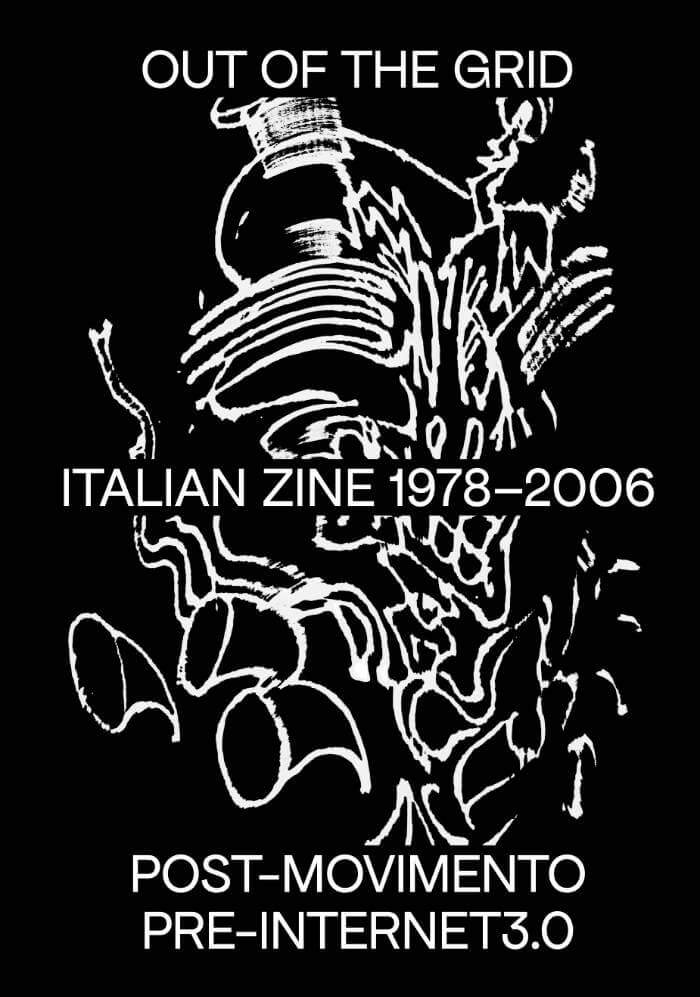
Out of the Grid – Italian Zine 1978-2006
Dafne Boggeri, Sara Serighelli
Out of the Grid presents a critical selection of 100 Italian zines from 1978 to 2006 that display a broad spectrum of social, political, aesthetic, and technological changes in the use of language and communication strategies across the territory of self publishing.
Widely mapping Italian society, particularly youth culture—over an extended period that can be symbolically defined as the "post-movement" and "pre-internet3.0"—, this outpouring of creativity gave visibility to small, imaginative and technical shifts on paper that made mimeographs, photocopiers and offset machines tremble, and often erupted into the need to communicate through other mediums. The titles selected originated from different scenes—musical, social, artistic, literary...—within which the distances between authors and readers is eliminated. To help navigate this multitude of subcultures, each zine is introduced by a profile that provides further analysis and information. No specific structure has been imposed, leaving room for the specific characteristics of each project to emerge. 100 titles ∞ paths.
Contribution by Marta Zanoni; interviews with Dafne Boggeri, Gino Gianuizzi, Stefano Gilardino, Glezös, Fabiola Naldi, Lorenza Pignatti, Pietro Rivasi, Giulia Vallicelli [Compulsive Archive].
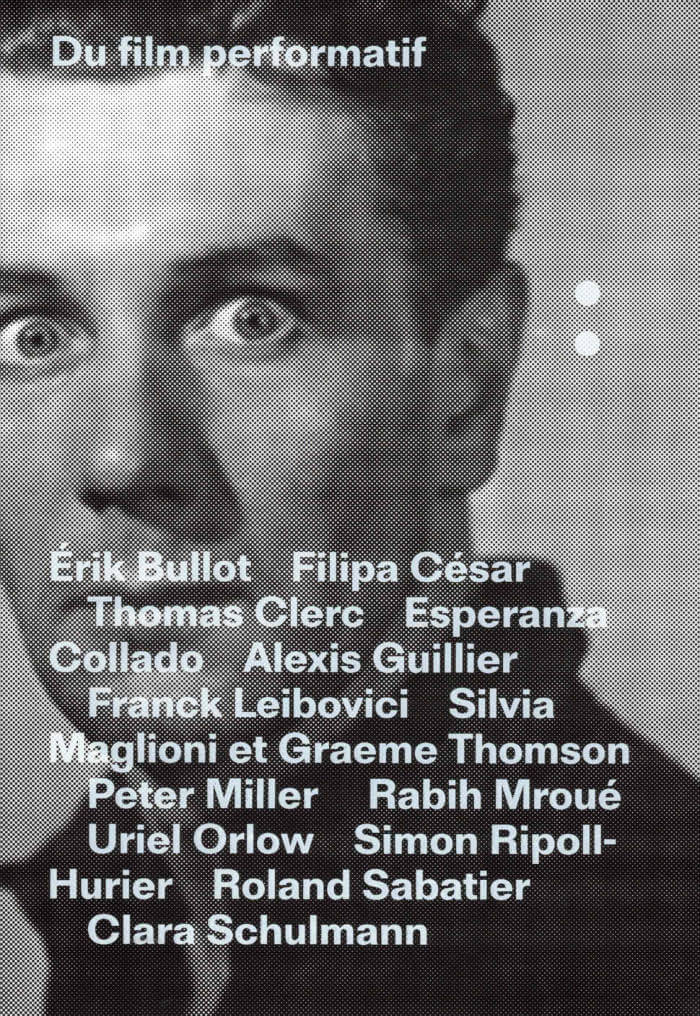
Du film performatif
Mapping the practices of performative cinema today.
Texts by Érik Bullot, Filipa César, Esperanza Collado, Thomas Clerc, Alexis Guillier, Franck Leibovici, Silvia Maglioni & Graeme Thomson, Peter Miller, Rabih Mroué, Uriel Orlow, Simon Ripoll-Hurier, Roland Sabatier, Clara Schulmann.

Feminist Takes – “Early Works” by Želimir Žilnik
The prospects of revolutionary feminism, from Želimir Žilnik's canonical film.
Canonical within the Yugoslav New Film of the late 1960s and the 1970s, Želimir Žilnik's Early Works (1968) follows the female revolutionary Jugoslava as she leaves her lumpenproletariat family to spread the teachings of young Marx and Engels among the peasants and factory workers. The violent responses to this proselytizing mission, which include the rape of Jugoslava and the beating of her three male comrades, invoke the repression of the 1968 student movement in socialist Yugoslavia. The film's allegorical examination of the contradictions of Yugoslav state socialism culminates when Jugoslava becomes the object of her comrades' violence, who shoot her and set her body on fire.
This edited volume, a part of Antonia Majaca's ongoing collaborative investigation Feminist Takes, initiates a discussion of the filmic—and historical—fate of Jugoslava and the prospects of revolutionary feminism.
From his beginnings in the lively amateur film scene of Yugoslavia in the 1960s, filmmaker Želimir Žilnik (born 1942, based in Novi Sad, Serbia) has gone on to make more than fifty films, including a number of feature films and TV productions, often in the genre of docudrama. He received international recognition early on, winning the Golden Bear for Best Film at the 1969 Berlin International Film Festival for Early Works. In the 1970s his films encountered political opposition, and he left Yugoslavia for West Germany, where he realized several independent films, including some of the earliest films dealing with the topic of guest workers. In the 1980s, after leaving Germany—due to his films once again facing political opposition and censorship—and returning to Yugoslavia, he made numerous TV and feature films through which he portrayed early symptoms of the country's growing social conflicts, continuing in the 1990s with films dealing with the maladies of the post-socialist transition as well as questions of migration.
Edited by Antonia Majaca, Rachel O'Reilly, Jelena Vesić.
Texts by Ivana Bago, Angela Dimitrakaki, Branislav Dimitrijević, Irmgard Emmelhainz, Rose-Anne Gush, Vesna Kesić, Vedrana Madžar, Antonia Majaca, Jaleh Mansoor, Ruth Noack, Bojana Pejić, Ana Teixeira Pinto, Rasha Salti, Kerstin Stakemeier, Jelena Vesić, Giovanna Zapperi.

Politically Red
Sara Nadal-Melsio, Eduardo Cadava
How reading and writing are collective acts of political pedagogy, and why the struggle for change must begin at the level of the sentence.
"Reading is class struggle," writes Bertolt Brecht. Politically Red contextualizes contemporary demands for social and racial justice by exploring the shifting relations between politics and literacy.
Through a series of creative readings of Karl Marx, Rosa Luxemburg, Walter Benjamin, W. E. B. Du Bois, Fredric Jameson, and others, it casts light on history as an accumulation of violence and, in doing so, suggests that it can become a crucial resource for confronting the present insurgence of inequality, racism, and fascism. Reading between the lines, as it were, and even behind them, Cadava and Nadal-Melsió engage in an inventive mode of activist writing to argue that reading and writing are never solitary tasks, but always collaborative and collective, and able to revitalize our shared political imagination.
Drawing on what they call a "red common-wealth"—an archive of vast resources for doing political work and, in particular, anti-racist work—they demonstrate that sentences, as dynamic repositories of social relations, are historical and political events.

The Singularity
The Singularity is a study of grief, migration, and motherhood from one of Sweden's most exciting new novelists.
In an unnamed coastal city filled with refugees, the mother of a displaced family calls out her daughter's name as she wanders the cliffside road where the child once worked. The mother searches and searches until, spent from grief, she throws herself into the sea, leaving her other children behind. Bearing witness to the suicide is another womanon a business trip, with a swollen belly that later gives birth to a stillborn baby. In the wake of her pain, the second woman remembers other losses—of a language, a country, an identity—when once, her family fled a distant war.

GLEAN - Issue 2 (NL edition)
De tweede Nederlandstalige GLEAN editie.
Jan Van Imschoot – Painting with a Vengeance
Jan Van Imschoot was tien jaar oud toen hij voor het eerst naar het Lam Gods van Jan van Eyck ging kijken. Tot op vandaag laat het schilderij hem niet los. ‘Het is de moeder van alle meesterwerken. Niemand heeft het ooit echt kunnen vatten, zelfs als je daar een heel leven aan zou wijden blijft het een mysterieus werk.’ Kathleen Weyts sprak met de schilder naar aanleiding van zijn grote overzichtstentoonstelling in het S.M.A.K.
Aay Liparoto – Small Acts of Violence
Wat gebeurt er als liefde gepaard gaat met fysiek of verbaal geweld? Wat als we zelf degene zijn die gewelddadig zijn? Herkennen we onszelf als dader? En hoe verhouden liefde en geweld zich tot een gevoel van veiligheid? Aay Liparoto’s filmische VR-ervaring in argos, Small Acts of Violence, verkent de verstrengeling van liefde, onvrijwillig fysiek geweld en zelfverwonding in intieme en familierelaties. Bas Blaasse ging met hun in gesprek.
Dorothy Iannone – Alles op Venus
De tentoonstelling Love Is Forever, Isn’t It? in het M HKA extraheert een overzicht uit het rijke en gelaagde oeuvre van Dorothy Iannone. Haar oeuvre heeft onmiskenbaar een narratief karakter: duizenden woorden, zinnen, alinea’s, brieven en teksten krioelen kleurrijk doorheen de zalen van het museum. Het is onmogelijk om alles te lezen, laat staan alle narratieven mee te krijgen. Maar alle aspecten van Iannone’s kunst komen aan bod en leven naast elkaar in een niet-lineair verhaal. Dagmar Dirkx bespreekt de expo.
Voorbij de leegte van de woestijn
Wolfram Vandenbergen en Frederik Thys bespreken de expo Performing Colonial Toxicity die momenteel loopt bij Framer Framed in Amsterdam. Architectuurhistorica Samia Henni construeert een alternatief archief voor de amper gekende nucleaire bladzijde uit de koloniale geschiedenis van Algerije. Een alternatief archief, want hoewel officiële documenten over het koloniale nucleaire programma in Algerije bestaan, houdt de Franse overheid ze vooralsnog achter slot en grendel.
Boeken
In onze maandelijkse boekenrubriek licht Els Roelandt twee recente boeken uit: The Uncanny van de als documentair fotograaf opgeleide Léonard Pongo, en Bring No Clothes: Bloomsbury and the Philosophy of Fashion door Charlie Porter. Door de vele zwart-witfoto’s van de Bloomsbury Group zouden we haast vergeten dat de leden ervan met regelmaat in uitbundige kleuren gekleed gingen, en bovendien zelf graag hun eigen kleren maakten en repareerden. Zo werd handwerk een filosofie en een manier van in het leven staan, een boodschap waarin Porter troost, comfort en geluk vindt.
Verder in november
Naar aanleiding van hun 25-jarig bestaan gaat Tamara Beheydt in gesprek met de coördinator van NICC, Anyuta Wiazemsky Snauwaert. Isabelle De Baets spreekt met de Nederlandse kunstenaar, toekomstdenker en schrijver Louwrien Wijers. Barbara De Coninck bezoekt kunstverzamelaar Walter Vanhaerents, de man achter de Vanhaerents Art Collection. We bespreken de performance Swallow Me Whole van Flora Van Canneyt en Ans Van Gasse. En uiteraard geven we een royale selectie ‘gleanings’, onze redactionele tips van lopende tentoonstellingen en niet te missen evenementen en happenings. Met onder andere Mashid Mohadjerin en Shervin/e Sheikh Rezaei bij Cc Strombeek, Hélène Amouzou en Nicole Eisenman in Londen, twee expo’s in Berlijn, en in Brussel de groepstentoonstelling Connecting bij KANAL, Laurent Dupont bij Gauli Zitter, Léon Wuidar bij Rodolphe Janssen en Mariana Castillo Deball bij Mendes Wood DM.

GLEAN - Issue 2 (ENG edition)
Striking a balance between lightness and seriousness, this Winter Issue of GLEAN offers plenty of in-depth reflection as well as a glimpse of what lies around the corner.
Guest Editor: Oscar Murillo
For each issue, GLEAN invites a Guest Editor to curate a section of the magazine. We interview them and ask them to invite three writers or artists who have influenced their practice (or who otherwise deserve our attention) to take up space in our pages. Oscar Murillo (1986, La Paila, Colombia) lives and works between London, La Paila and (since recently) Brussels. On the occasion of his first solo show at WIELS in Brussels, titled ‘Masses’, which opens in February 2024, we asked him to serve as Guest Editor for our Winter Issue. Murillo asked curator and researcher Renan Laru-an and writer and producer Anna T. Pigott to contribute texts. Artist and writer Rene Matic provided a visual contribution.
Studio Visit: Che Go Eun
Finding an affordable and suitable studio space is perhaps one of the greatest challenges a young artist faces. Not only does there seem to be a shortage of adequate infrastructure in densely populated cities such as Antwerp or Brussels, but the rental prices are also very high. Level Five VZW is an artist cooperative managing several studio spaces in Brussels. Tamara Beheydt visited artist Che Go Eun in her shared studio space at Level Five’s location next to WIELS Contemporary Art Centre.
The Artist’s Library
Each issue, Els Roelandt delves into the personal library of an artist for the Artist’s Library – a column celebrating books and their writers, editors, publishers, designers and readers. For this month’s contribution, she visited Olivia Plender in Stockholm on a dark afternoon in November. The two browsed and discussed Plender’s impressive library, which contains many titles related to plants, feminism and books by and on women who are carrying on the struggle to dismantle patriarchal structures.
Hana Miletic
Having transitioned from a kind of street photography to weaving, Hana Miletic embraces the act of reproduction. Her work with textiles has evolved into an embodied and social practice. Miletic contributed the cover images for this Winter Issue, which are also being printed as a limited GLEAN artist’s edition. María Inés Rodríguez, director of the Walter Leblanc Foundation in Brussels, met up with the artist, who is gearing up for a busy season. Miletic’s work is on view in no fewer than four group shows across Europe and her first solo exhibition in the US will open next spring.
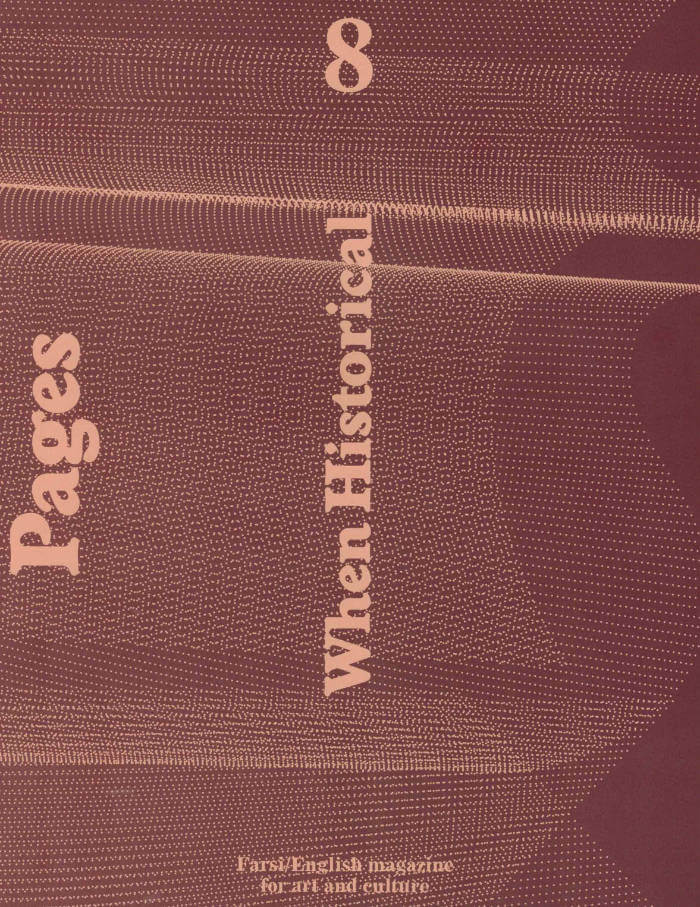
Pages 8 - When Historical
Nasrin Tabatabai, Babak Afrassiabi
What determines our place in history? If it is the past, there we also find the material support with which we reconstitute our historical place. Our relation to history remains retrospective, but also anticipatory.
Events begin with a break from history. But they soon are recaptured by it and fetishized as historical triumphs or failures. Still something remains of past events that, although conditioned by history, is irreducible to it: a surplus that finds way to our time, something out of time that forces us to actively anticipate a renewing in past events.
With contributions by:
- Dariush Moaven Doust / Machinic Life
- Alireza Rasoulinejad & Saleh Najafi / Minor/Major [conversation]
- Norman Klein / Imaginary Future and the Archive [interview]
- Gerald Raunig & Roberto Nigro / Molecular Revolution and Event
- Saleh Najafi / Hope Against Hope
- Sven Augustijnen / Coincidences of History: Reflections on E'mile Meurice's 'Sketch for a psychologial study of Leopold II'
- Jalil Ziapour, Houshang Irani, Gholam Hossein Gharib / Excerpt from Khoroos Jangi magazine, 1949-50
- Performance in Iran [conversation] with Neda Razavipour, Jinoos Taghizadeh, Shahab Fotouhi, Bavand Behpour, Amir Mobed and Mahmoud Bakhshi
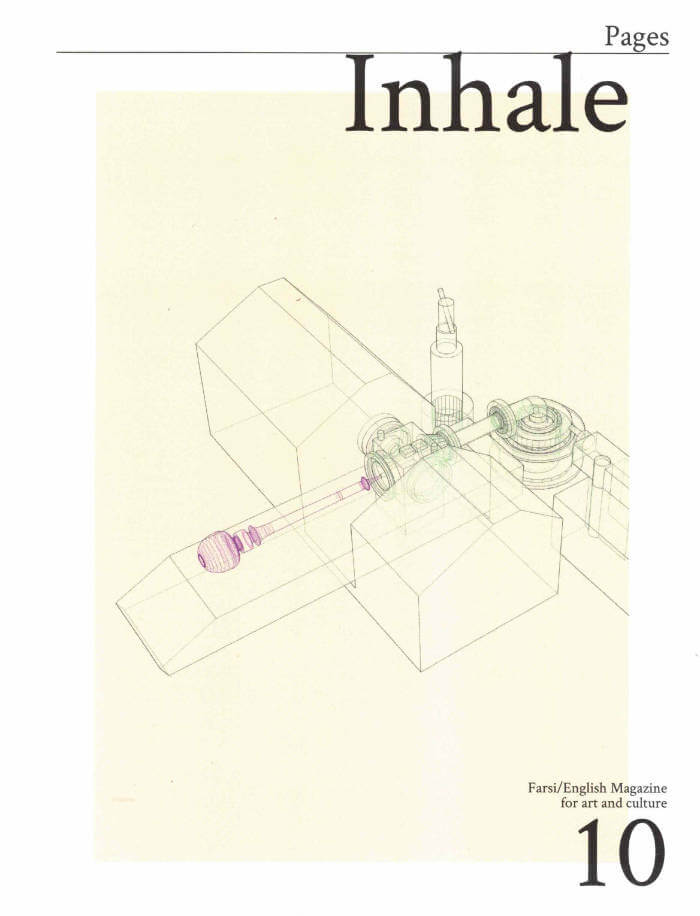
Pages 10 - Inhale
Nasrin Tabatabai, Babak Afrassiabi
The theme of this issue of Pages was triggered by the idea of opium smoke as a ‘writing machine.’ Since the early opium trade, there has been writing not only on opium, but also through opium, especially in countries linked to past and present drug networks. In this issue we are tapping into the deeply rooted relationship between writing and drugs, especially beyond the Western literary tradition, and wondering about the current conceptual and material derivatives of intoxication with which we can machinate new extremities in our chemical, historical and technological relations to the world.
With contributions by:
- Jason Bahbak Mohaghegh / Smoke, Drug, Poison: A Philosophy of the Faramoosh-Khaneh (Opium Den)
- Pages / Dissolving, Mixing, Melting, Stirring (the Smoke)
- Hung-Bin Hsu / The Taste of Opium: Science, Monopoly and the Japanese Colonization in Taiwan, 1895—1945
- Saleh Najafi / Hedayat: The Opium of Translation and Creating the Impossible Memory
- Patricia Reed / The Toxicity of Continuity
- Fuko Mineta / A Monster Appears in Qingtian
- Morad Farhadpour / Inside and Outside Addiction
- Mohammad-Ali Rahebi / Of Junk and Time: Trauma, Habit, Capitalism

Pages 9 - Seep
Babak Afrassiabi, Nasrin Tabatabai
This issue of Pages assumes seep as a post archival mode: in the Merriam-Webster dictionary the verb 'seep' is translated as follows: to flow or pass slowly through fine pores or small openings, to enter or penetrate slowly, to become diffused or spread.
The biology or politics of seeping is like that of raw petroleum oozing at natural oil seeps. Unlike refined oil which has sponsored modernization and its aligned archives, crude oil pours beyond historical purpose and defies structural elevations. It instead disfigures the ground through which it dubiously spreads.
Seeping is a posthumous affair. It is the gradual leaking of a long withdrawn interior. Like the bleeding of a punctured corpse, when the pumping of the heart has stopped, when the body is lifeless and apathetic to any 'hail', yet continuing to bleed. Seep as archive is an eternally post-apocalyptic expansion, retraction, deviation, subtraction, or simply the arrival of (non-)things.
With contributions by:
- Mariam Motamedi Fraser / Geo-Archive
- Richard Goldstein / Dennis Oppenheim's Dilemma: Should he Sell Art to the Shah?
- Babak Afrassiabi, Nasrin Tabatabai / Contemporary Hole / Unfilmable
/ Seep
- Saleh Najafi / Wounds of Archive¹
- Mark von Schlegell / The Artist Abstract #6
- Nima Parzham / The underground
- Adam Kleinman / Vanished Theories
- Suzanne Treister / Algorithm
- Alexi Kukuljevic / The Dissolute Subject
- Matts Leiderstam / Andy Warhol, Suicide (Purple Jumping Man), 1963
- Eugene Thacker / Black Infinity; or, Oil Discovers Humans
- Vivian Ziherl, Natasha Ginwala / Infrastructural Suspensions: Global Spanning, Atmospheric Seepage and Measures of the Undecidable

A take away cup and a cloud
A take away cup and a cloud is an essay written alongside the dance performance Seems to be by Denise Lim and Stina Ehn. It plays with a variety of containers–the list form being one. By mixing a personal with a historical gaze it traces the trajectory of mundane commodities and the replacement of material with imaterial objects brought about to the everyday by technical progress.
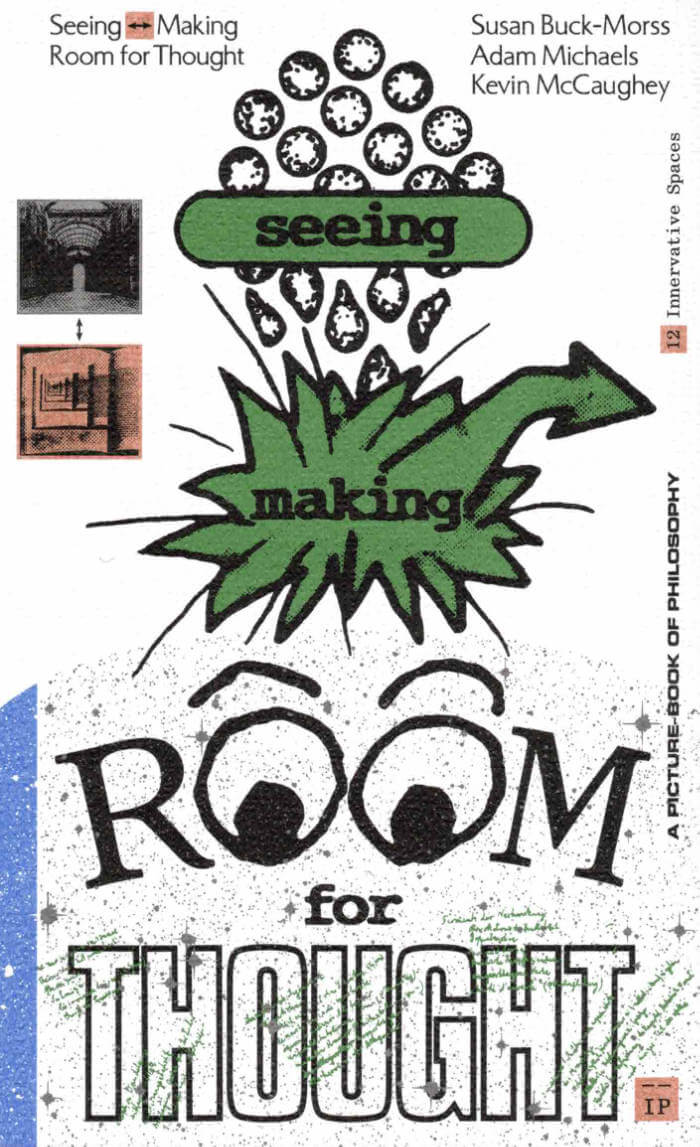
Seeing Making: Room for Thought
Adam Michaels, Kevin McCaughey and 1 more
Seeing <―> Making: Room for Thought both studies and presents the creative process of constructing ideas with images. By activating the techniques of montage, the book reveals a wide field of view and a space to engage new critical connection between a multiplicity of objects from the past and present. Realized through an intergenerational collaboration of three cultural producers committed to making theory visible, a transformative anthology of critical essays by Susan Buck-Morss anchors this kaleidoscopic project. Images and ideas sync with Buck-Morss’ perceptive texts on visual culture, history, politics, and aesthetics, fusing criticism with visual play and linking collective imagination and social action.
Building upon the methods and ways of seeing put forth by visual thinkers like Walter Benjamin and John Berger, designer Kevin McCaughey (Boot Boyz Biz), designer, editor, and publisher Adam Michaels (IN-FO.CO/Inventory Press), and renowned theorist Buck-Morss collectively assemble colliding material into new relation. What results is a (typo-) graphic articulation that thinks seriously about the stakes of ideation and reorients the space of the book in the service of a theory and philosophy that speaks the language of our image-based information age.

Love Is Colder Than the Lake
Searing in its energies and mysterious in its icy depths, Love is Colder than the Lake is a tour-de-force of the experimental French poet Liliane Giraudon's power and range.
Love is Colder than the Lake weaves together stories dreamed and experienced, fragments of autobiographical trauma, and scraps of political and sexual violence to create an alchemical and incantatory texture that is all Giraudon's own. In its feminist attention and allusive stylistic registers, Love is Colder than The Lake claims a unique position among contemporary French literature. The heroes (or anti-heroes) in this collection include Rainer Werner Fassbinder, Lorine Niedecker, Emma Goldman, Chantal Akerman, the Marquis de Sade, and the unnamed lake itself. Giraudon's writing, editing, and visual work have been influential in France for decades, and English-speaking readers will thrill to this challenging, important voice.
Liliane Giraudon was born in Marseille in 1946. She continues to live and work in Marseille, and her writing is inseparable from the place, shaped by the vibrant community of poets and writers and artists Giraudon has herself shaped, as well as by the city's gritty and diverse cosmopolitanism. Giraudon's many books have, since 1982, been primarily published by France's P.O.L. editions. Giraudon has also been instrumental as an editor for influential reviews such as Banana Split, Action Poétique, and If. She performs and collaborates widely, including with Nanni Balastrini, Henri Delui, Jean-Jacques Viton, and many others. Two of her books ( Fur and Pallaksh, Pallaksh) were published in English by Sun & Moon Press in 1992 and 1994, respectively. She lives in Marseille, France.
Lindsay Turner is the author of the poetry collections Songs & Ballads (Prelude Books, 2018) and The Upstate (University of Chicago Press, 2023). She has twice received French Voices awards for her translations from the French, which include books of poetry and philosophy by Stéphane Bouquet, Souleymane Bachir Diagne, Anne Duforumantelle, Ryoko Sekiguchi, and others. She is Assistant Professor of English and Creative Writing at Case Western Reserve University in Cleveland, Ohio.
Sarah Riggs is a poet and multivalent artist. Her most recent book The Nerve Epistle appeared in 2021. Translation is one of her arts, for which she received a Griffin prize with Etel Adnan, and Best Translated Book Award, also for Adnan's Time (Nightboat, 2019). Riggs lives in Brooklyn, after many years in Paris. Author residence: Marseille, France.

A Beauty Has Come
A collection of psychedelic poems inspired by Egyptian queen, Nefertiti, exploring the slippage between her image and legacy across time, place, and space.
A Beauty Has Come takes the reader on a sonic exploration across desert plains and resonant soundscapes as Nefertiti, "The Beautiful One," comes into being and Blackness on the page. Written from within the physical limitations of lockdown and informed by her work as a psychoanalytic student, Jasmine Gibson's poems are a surrealist playlist drawn from the mystic and the viscerally real. Utterly rejecting the lies and logic of capitalism, this book invites the reader to look deeply into the unconscious life of this world, before shaking it off in the spirit of resistance and joy.

Disobedience
Structured as a long series of interconnected poems in which one of the main elements is an ongoing dialogue with a seedy detective, Disobedience sets out to explore the visible as well as the unconscious. These poems, composed during a fifteen-month period, also deal with being a woman in France, with turning fifty, and with being a poet, and thus seemingly despised or at least ignored.
Alice Notley has earned a reputation as one of the most challenging and engaging radical female poets at work today. Her last collection, Mysteries of Small Houses, was a finalist for both the Pulitzer Prize in poetry and the Los Angeles Times Book Prize.

Whites, Jews, and Us: Toward a Politics of Revolutionary Love
A scathing critique of the Left from an indigenous anti-colonial perspective.
With Whites, Jews, and Us, Houria Bouteldja launches a scathing critique of the European Left from an indigenous anti-colonial perspective, reflecting on Frantz Fanon's political legacy, the republican pact, the Shoah, the creation of Israel, feminism, and the fate of postcolonial immigration in the West in the age of rising anti-immigrant populism. Drawing upon such prominent voices as James Baldwin, Malcolm X, and Jean Genet, she issues a polemical call for a militant anti-racism grounded in the concept of revolutionary love.
Such love will not come without significant discomfort for whites, and without necessary provocation. Bouteldja challenges widespread assumptions among the Left in the United States and Europe—that anti-Semitism plays any role in Arab-Israeli conflicts, for example, or that philo-Semitism doesn't in itself embody an oppressive position; that feminism or postcolonialist theory is free of colonialism; that integrationalism is a solution rather than a problem; that humanism can be against racism when its very function is to support the political-ideological apparatus that Bouteldja names the "white immune system."
At this transitional moment in the history of the West—which is to say, at the moment of its decline—Bouteldja offers a call for political unity that demands the recognition that whiteness is not a genetic question: it is a matter of power, and it is high time to dismantle it.
"Why am I writing this book? Because I share Gramsci's anxiety: "The old are dying and the new cannot be born; in this interregnum a great variety of morbid symptoms appear." The fascist monster, born in the entrails of Western modernity. Of course, the West is not what it used to be. Hence my question: what can we offer white people in exchange for their decline and for the wars that will ensue? There is only one answer: peace. There is only one way: revolutionary love." — from Whites, Jews, and Us
This Semiotext(e)/Intervention series English-language edition includes a foreword by Cornel West.
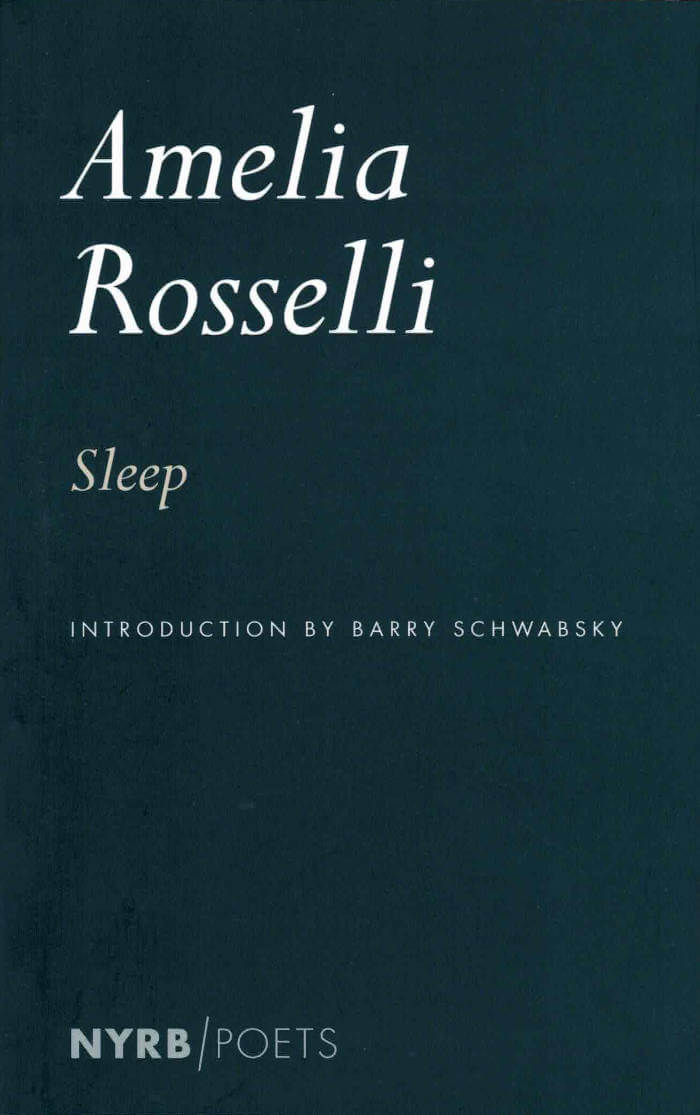
Sleep
A major, career-spanning collection of an Italian master's poetry in English, gathered together for the first time.
Amelia Rosselli is one of the great poets of postwar Italy. She was also a musician and musicologist, close to John Cage and Karlheinz Stockhausen, and she waged a lifelong battle against depression. The child of Carlo Rosselli, a significant anti-fascist intellectual who was assassinated with his brother Nello in 1937, Amelia grew up in exile and attended high school in Mamaroneck, New York. English poetry, especially the lyrics and sonnets of Shakespeare and the Elizabethans, became a prime reference for her own poetry, which combines modernist experimentation with variations on more traditional forms.
The elaborate, archaic, yet thoroughly modern poems, at once stumbling and singing, that Rosselli composed in English and gathered under the title Sleep are a beautiful and illuminating part of her work. Six of the poems were published by John Ashbery in the 1960s but have otherwise been unavailable to English readers. They are published here for the first time outside of Italy.

Nicolas Pages
An ode to mad love, awarded the Prix de Flore in 1999.
Published in 1999 and awarded that year's Prix de Flore, Nicolas Pages marks a departure from the Sadean preoccupations of Guillaume Dustan's first three novels; it is, in essence, a love story. Inspired by a failed romance with the Swiss artist-writer Nicolas Pages and collaging texts that Dustan initially produced for a wide variety of other occasions (magazine articles, short stories, project notes, shopping lists, and more), the "auto-/bio-/porno-graphic" prose of Nicolas Pages is by turns trashy and encyclopedic, corporeal and philosophical. Here Dustan inaugurates a "gay literature" that is no longer painful or shameful, but epicurean and cheerful without ever lapsing into idealism. A vibrant plea for gay rights and a tapestried text that is more than the sum of its many styles, Nicolas Pages is a call to explore the body, sexuality, and writing in all their variety; it is a hymn to life, humanity, pleasure, and desire.
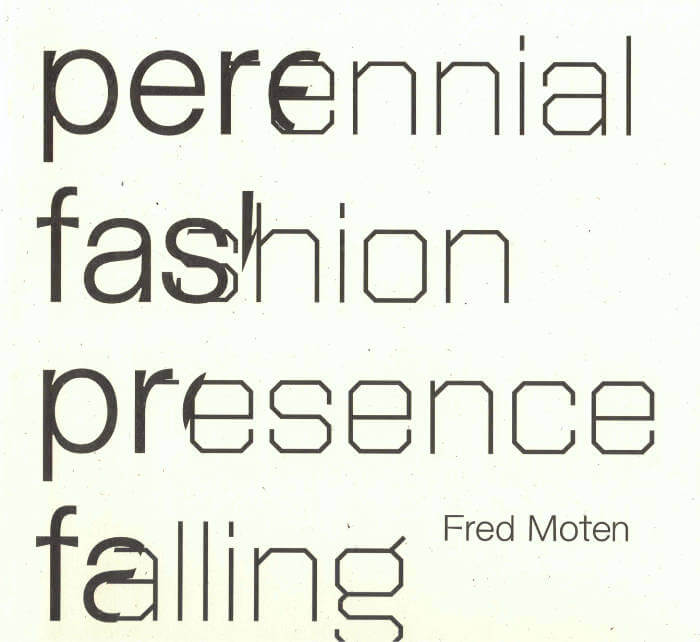
Perennial Fashion Presence Falling
Latest poetry collection from poet, critic, theorist, and MacArthur fellow and Guggenheim Fellow, Fred Moten.
"...some ekphrastic evening, this'll be both criticism and poetry and failing that fall somewhere that seems like in between."
So writes poet, critic, theorist, and MacArthur fellow Fred Moten in his latest poetry collection PERENNIAL FASHION PRESENCE FALLING. Much like the poems found in The Feel Trio (Letter Machine 2014), which was a National Book Award finalist, and All That Beauty (Letter Machine, 2019), the poems here present Moten's "shaped prose" on the page and the dizzying brilliance of both polyphonies and paronomasia. Within this collection, the poems hold an innate quantum curiosity about the infinitude of the present and the ways in which one could observe the history of the future. Poems beget poems, overflowing and flowering, urging deeper etymological investigations. In perennial fashion presence falling, Moten approaches the sublime, relishing that intermediary space of microtonal thought.
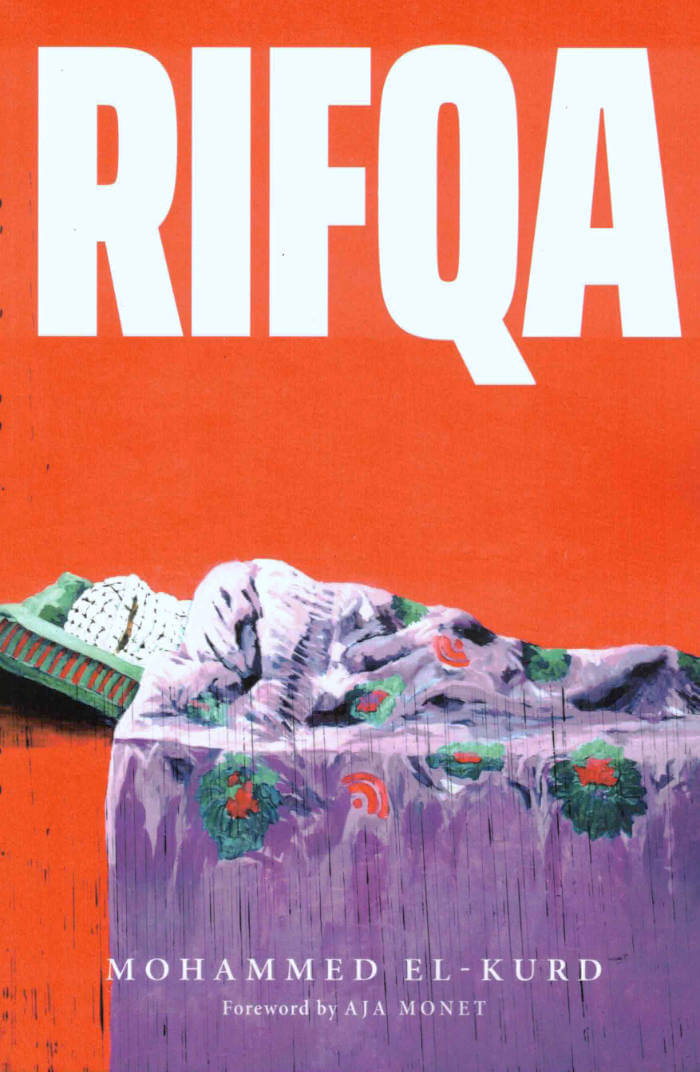
Rifqa
Rifqa is Mohammed El-Kurd’s debut collection of poetry, written in the tradition of Ghassan Kanfani’s Palestinian Resistance Literature. The book narrates the author’s own experience of dispossession in Sheikh Jarrah—an infamous neighborhood in Jerusalem, Palestine, whose population of refugees continues to live on the brink of homelessness at the hands of the Israeli government and US-based settler organizations. The book, named after the author’s late grandmother who was forced to flee from Haifa upon the genocidal establishment of Israel, makes the observation that home takeovers and demolitions across historical Palestine are not reminiscent of 1948 Nakba, but are in fact a continuation of it: a legalized, ideologically-driven practice of ethnic cleansing.
Mohammed El-Kurd is a Palestinian writer and poet from Sheikh Jarrah in East Jerusalem. He was pursuing a Master's in the United States before returning to Sheikh Jarrah to protest the ethnic cleansing of his family. He has gained prominence for his description of Israeli occupation as apartheid and settler colonialism.
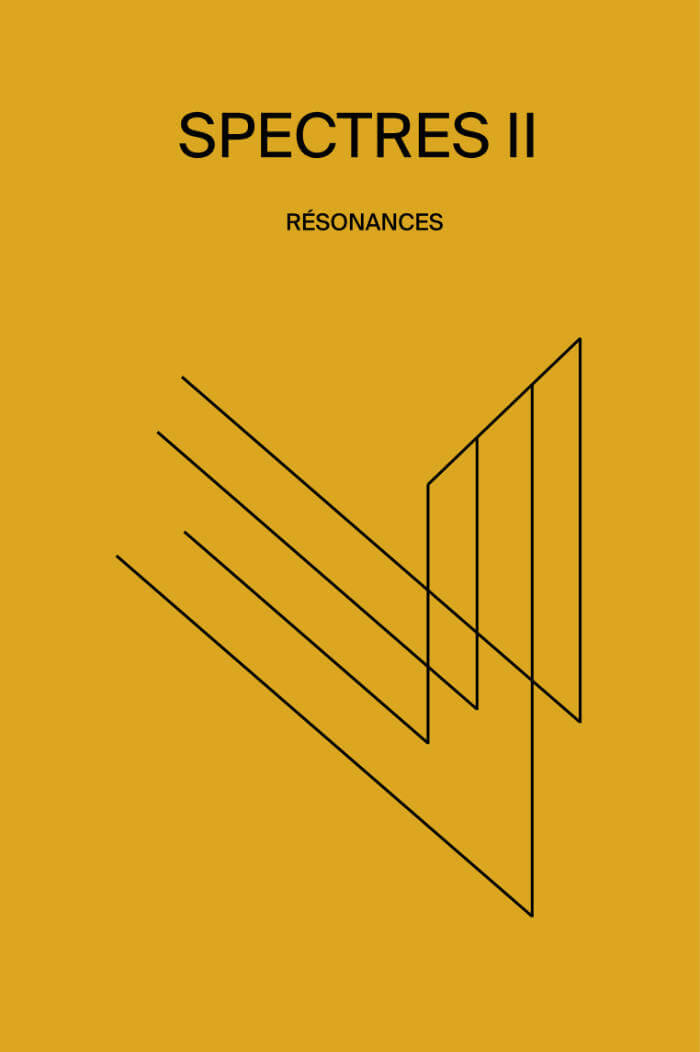
Spectres #02 – Resonances
Bartolomé Sanson, François Bonnet
The second issue of Spectres is devoted to the concept of resonances, with contributions by Maryanne Amacher, Chris Corsano, Ellen Fullman, Christina Kubisch, Okkyung Lee, Pali Meursault, Jean-Luc Nancy, David Rosenboom, Tomoko Sauvage, The Caretaker, David Toop, and Christian Zanési.
To resonate: re-sonare. To sound again—with the immediate implication of a doubling. Sound and its double: sent back to us, reflected by surfaces, diffracted by edges and corners. Sound amplified, swathed in an acoustics that transforms it. Sound enhanced by its passing through a certain site, a certain milieu. Sound propagated, reaching out into the distance. But to resonate is also to vibrate with sound, in unison, in synchronous oscillation. To marry with its shape, amplifying a common destiny. To join forces with it. And then again, to resonate is to remember, to evoke the past and to bring it back. Or to plunge into the spectrum of sound, to shape it around a certain frequency, to bring out sonic or electric peaks from the becoming of signals.